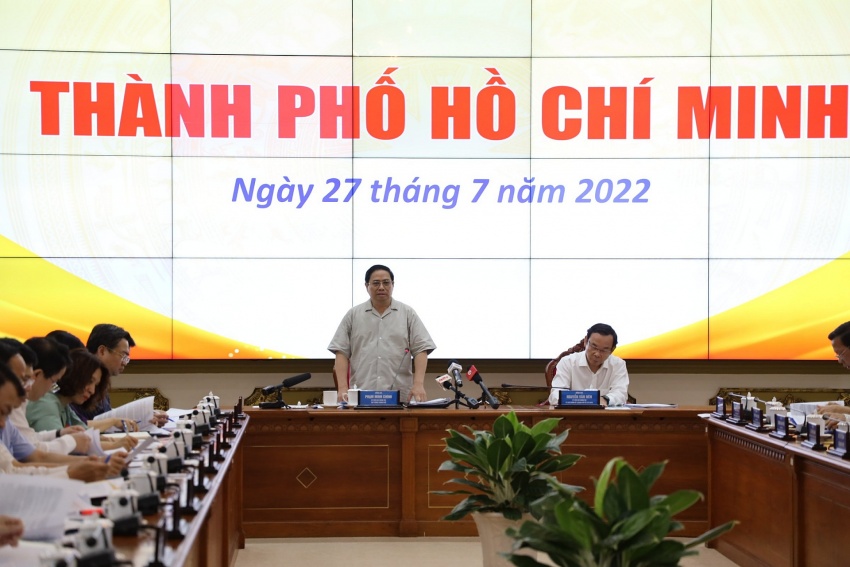Prime Minister outlines development policies for Ho Chi Minh City
On July 27, Prime Minister Pham Minh Chinh and the government's delegation worked with Ho Chi Minh City authorities to analyse socioeconomic progress over the last seven months and to break through the obstacles that several delayed projects are facing.
 |
| Prime Minister Pham Minh Chinh and the government's delegation at the meeting on July 27 |
To maintain its leading position, leaders of Ho Chi Minh City proposed the removal of a series of issues from policy mechanisms, decentralisation, and legal obstacles for each specific project. Through working with the Government Office and ministries, 15 issues were proposed by Ho Chi Minh City People's Committee for approval.
Chairman of Ho Chi Minh City People's Committee Phan Van Mai suggested that the government should issue a resolution to accelerate the progress of a range of key projects such as Ring Road No.3. Ring Road No.4’s policy should also be submitted to the National Assembly for approval by mid-2023.
Ho Chi Minh City also asked PM Chinh to approve the policy of allowing seven land plots to be used to compensate for two projects under a build-transfer contract, including three land plots for anti-tidal flood protection projects and four others reserved for the road project connecting Pham Van Dong to the Go Dua-National Highway 1 intersection in Thu Duc City.
Also at the meeting, Mai requested that the government, ministries, and branches remove problems related to public land interspersed in residential areas, lease houses, and land managed by public units.
Mai also wants to see capital for three hospital projects located in Hoc Mon, Cu Chi, and Thu Duc, more implementation time for the metro project No.2, and the allocation of more medium-term capital for completing the metro line No.1.
Nguyen Van Nen, Politburo member and Secretary of Ho Chi Minh City Party Committee, said that in the past, the government and prime minister have made many decisions to remove obstacles and open mechanisms for the city. Currently, the development of Ho Chi Minh City is facing bottlenecks in the institutions, infrastructure, and human resources that need support from the central government.
Reaffirming that Ho Chi Minh City is always aware of its responsibility for the development of the country, Nen said that the city is focusing on summarising Resolution No.16 issued in 2012 by the Politburo and Resolution No.54 from 2017 by the National Assembly to permit Ho Chi Minh City to implement pilot projects where information is not yet available or where previous studies are no longer appropriate.
Concluding the meeting, PM Chinh highly appreciated the achievements of Ho Chi Minh City, noting that its budget revenue accounted for nearly one-third of the country's total.
To achieve that result, Ho Chi Minh City has creatively implemented the guidelines of the Party, the National Assembly, and the government, made efforts to overcome the difficulties of the political system, and closely coordinated with central agencies.
Agreeing with the proposal of the leaders of Ho Chi Minh City, the prime minister emphasised that where there is no current law or where the laws no longer match reality, the city can undertake pilot projects, gain experience, and gradually expand it into other fields.
Ho Chi Minh City's GRDP growth rate in the first six months of the year is estimated to increase by 3.8 per cent, with a total export turnover of goods of just under $25 billion. The total budget revenue for the first seven months of the year was about $12.3 trillion, reaching 73.2 per cent of the estimate.
From now until the end of the year, Ho Chi Minh City expects to achieve a GRDP growth rate of 7-7.2 per cent, which is higher than the target of 6-6.5 per cent.
What the stars mean:
★ Poor ★ ★ Promising ★★★ Good ★★★★ Very good ★★★★★ Exceptional
Related Contents
Latest News
More News
- SK Innovation-led consortium wins $2.3 billion LNG project in Nghe An (February 25, 2026 | 07:56)
- THACO opens $70 million manufacturing complex in Danang (February 25, 2026 | 07:54)
- Phu Quoc International Airport expansion approved to meet rising demand (February 24, 2026 | 10:00)
- Bac Giang International Logistics Centre faces land clearance barrier (February 24, 2026 | 08:00)
- Bright prospects abound in European investment (February 19, 2026 | 20:27)
- Internal strengths attest to commitment to progress (February 19, 2026 | 20:13)
- Vietnam, New Zealand seek level-up in ties (February 19, 2026 | 18:06)
- Untapped potential in relations with Indonesia (February 19, 2026 | 17:56)
- German strengths match Vietnamese aspirations (February 19, 2026 | 17:40)
- Kim Long Motor and AOJ Suzhou enter strategic partnership (February 16, 2026 | 13:27)

 Tag:
Tag:























 Mobile Version
Mobile Version